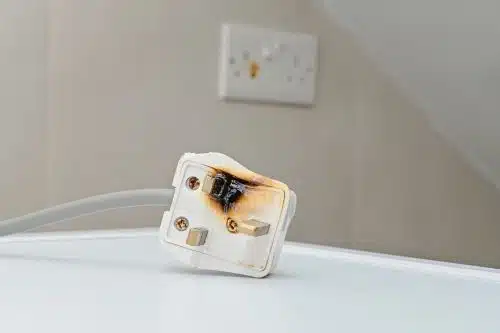Under North Carolina law, yes, you can file a lawsuit against the product’s manufacturer, distributors, wholesalers, and retailers. This means that your case could potentially have multiple defendants.
What Can You Expect From a Defective Product Lawsuit?
In a defective product lawsuit in North Carolina, you must prove negligence by the manufacturer and other defendants. Often this involves figuring out exactly what went wrong with the product in question, where, and how.
You might think, “The manufacturer made the product; isn’t the defect their fault?”
But it becomes more complicated when you realize that most manufacturers make products from components or raw materials they buy from other companies. It’s possible that the manufacturer and its managers had no idea the components they received were defective.
Although it’s prudent for someone at the factory to inspect orders as they come in, not all defects are apparent. In some cases, the component manufacturer may also be a defendant.
In other situations, the problem occurs at the manufacturer. This is the first of the three main types of defective product issues that you might file a claim for:
What is the “Innocent Seller” Defense?
North Carolina does allow retailers to use the “innocent seller” defense, in which a defendant can argue that the defective item was sealed and they had no opportunity to inspect it. However, this defense is only viable if the manufacturer is financially solvent and subject to jurisdiction in North Carolina.
In some cases, you might be able to counter the “innocent seller” defense by presenting evidence that the retailer damaged the product in some way, causing the defect. If your claim against the retailer is dismissed due to an “innocent seller” defense, you may still be able to seek compensation from the manufacturer and possibly other parties.
Defective Manufacturing
Even one defective product getting past a manufacturer’s “quality assurance” process can lead to injury for an unsuspecting customer. However, in many cases, we find that one or more entire lots or batches were somehow defective.
This could be due to a mistake in programming one of the automated processes or an issue with raw materials. Sometimes an equipment malfunction isn’t noticed until multiple items have been finished and shipped.
Another potential cause is when a company switches to a cheaper option for components, raw materials, or equipment, and the products begin suffering.
Regardless of what went wrong, the manufacturer should test its products for defects and remove any problematic units. Your lawyer will work to learn what happened and show that the manufacturer didn’t do enough to ensure consumer safety and quality.
Defective Design
Sometimes the manufacturing process goes smoothly, but all the items are affected by a design defect. Frequently this type of defect doesn’t show up in quality control tests, or if it does, the company writes these incidents off as unimportant.
In some cases, the defect in design may not be known for years.
One example would be the multiple lawsuits against the manufacturer of Zantac, a heartburn medication. In many defective drug cases, one or more lots are contaminated with another medicine, a toxin, or in some cases, glass or metal pieces, rendering the drug unsafe. (These would be defective manufacturing issues.)
But in the Zantac case, the problem was the medication itself. The active ingredient, ranitidine, was found to break down into a toxic compound, NDMA, which might increase the risk of cancer.
The longer the pills sat on the shelf before consumers used them, the more NDMA they contained. In this situation, the design was defective because the ranitidine molecule was unstable.
The FDA eventually ordered manufacturers to stop selling medicine containing ranitidine.
Failure to Warn
Many products are perfectly safe when used correctly but can become dangerous under certain circumstances.
Some cleaning chemicals are harmless unless you mix them with bleach. Heating food in a microwave is safe, but if you put a fork inside, you could cause a fire.
The reason you probably know these things already is that manufacturers include warnings on cleaning chemicals and microwaves to help consumers avoid hazardous situations. This is also why you would have difficulty suing the manufacturer if you ignored the warnings, put a metal fork in the microwave, and set it on fire.
After all, they did warn you not to do that.
But what if the manufacturer doesn’t warn you about a potential risk associated with using their product in a certain way? Most manufacturers work hard to include every possible warning – often leading to obvious and unnecessary warnings – to avoid liability for failure to warn claims.
But sometimes, the manufacturer ignores or conceals a potential risk, and consumers get hurt. If you used a seemingly safe product as directed and were injured, it’s possible the manufacturer failed to warn you of a particular risk.
How Do You Figure Out What Kind of Defective Product Lawsuit Claim You Have?
You’ll need to speak with a North Carolina defective product lawyer. They will study the details of your case and investigate the company and search for similar complaints about the product.
You can help by saving the defective product (unless it is unsafe to do so) so your attorney and possibly experts in the field can examine it. Once your lawyer has compiled enough evidence to file a lawsuit, they can request records and other evidence from the manufacturer (and other defendants named in the lawsuit).
Contact Tatum & Atkinson About Your Defective Product Lawsuit Today
If you suspect a defective product caused or worsened your injuries, please call Tatum & Atkinson at 800-LAW-0804 for a free consultation. Our legal team has recovered more than $100 million in compensation for our clients, and we’re happy to evaluate your case and explain your options.
If we take your case, we won’t charge you anything until we win or settle it.

